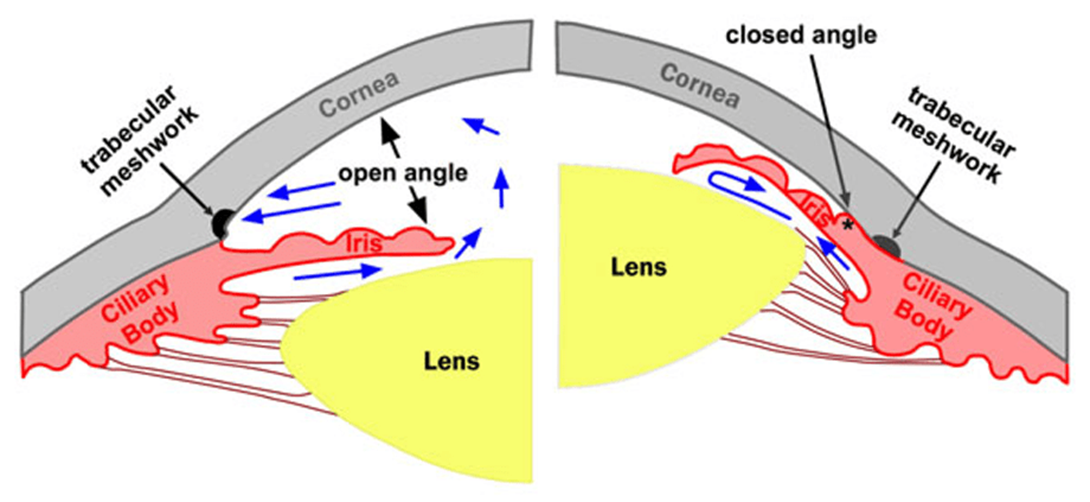A client is receiving miotics for the treatment of open-angle glaucoma. The nurse determines that a priority nursing problem is the risk for injury. This nursing problem is based on which etiology?
Decreased night vision.
Increased sensitivity to light.
Increased frequency of lacrimation.
Diminished color perception.
The Correct Answer is A
Choice A reason:
Decreased night vision is a significant concern for clients receiving miotics for open-angle glaucoma. Miotics, such as pilocarpine, work by constricting the pupil (miosis), which can reduce the amount of light entering the eye. This effect is particularly problematic in low-light conditions, leading to decreased night vision and increasing the risk of injury due to poor visibility
Choice B reason:
Increased sensitivity to light, also known as photophobia, can occur with the use of miotics, but it is not the primary concern related to the risk of injury. While photophobia can cause discomfort and avoidance of bright environments, it does not directly contribute to the risk of injury as significantly as decreased night vision.
Choice C reason:
Increased frequency of lacrimation (tearing) can be a side effect of miotics, but it is not a major factor in the risk of injury. Excessive tearing can cause discomfort and blurred vision temporarily, but it does not pose a significant risk for injury compared to decreased night vision.
Choice D reason:
Diminished color perception is not a common side effect of miotics. Miotics primarily affect the pupil size and accommodation, rather than color vision. Therefore, this choice is not relevant to the risk of injury associated with the use of miotics.

Nursing Test Bank
Naxlex Comprehensive Predictor Exams
Related Questions
Correct Answer is A
Explanation
Choice A Reason
Morphine, an opioid analgesic, is commonly prescribed for severe pain management, such as in cases of metastatic cancer. One of the well-known side effects of morphine is constipation. This occurs because opioids slow down gastrointestinal motility, leading to harder and less frequent stools. Therefore, it is crucial for patients taking morphine to monitor their bowel movements and use stool softeners or laxatives as needed to prevent constipation. This choice indicates that the client understands the importance of managing this common side effect, which can significantly impact their comfort and quality of life.
Choice B Reason
Grapefruit juice is known to interact with various medications by inhibiting the cytochrome P450 3A4 (CYP3A4) enzyme in the liver, which can lead to increased blood levels of certain drugs. However, morphine is primarily metabolized by the liver enzyme UGT2B7, not CYP3A4. Therefore, grapefruit juice does not significantly affect morphine metabolism. This choice reflects a misunderstanding of the specific interactions relevant to morphine.
Choice C Reason
Taking a benzodiazepine at the same time as morphine can be dangerous due to the risk of additive central nervous system (CNS) depression. Both morphine and benzodiazepines can cause sedation, respiratory depression, and impaired cognitive and motor functions. Concurrent use increases the risk of severe side effects, including potentially life-threatening respiratory depression. This choice indicates a lack of understanding of the risks associated with combining these medications.
Choice D Reason
While it is important to monitor for signs of agitation and insomnia, these are not the primary concerns associated with morphine use. Morphine is more likely to cause sedation rather than agitation, and insomnia is not a common side effect. This choice does not reflect a comprehensive understanding of the primary side effects and necessary precautions related to morphine use.
Correct Answer is ["A"]
Explanation
Choice A reason:
Heart sounds: Monitoring heart sounds is crucial for evaluating the effectiveness of medications in a client with heart failure and coronary artery disease. Changes in heart sounds, such as the presence of new murmurs or gallops, can indicate worsening heart failure or other cardiac complications1. Regular assessment helps in early detection and management of potential issues.
Choice B reason:
Blood pressure: Blood pressure monitoring is essential for clients with hypertension and those taking medications like atenolol and enalapril. These medications are used to manage blood pressure and reduce the workload on the heart. Regular monitoring ensures that the medications are effectively controlling blood pressure within the target range, typically less than 130/80 mm Hg.
Choice C reason:
Bowel sounds: While assessing bowel sounds is important for overall health, it is not directly related to evaluating the effectiveness of heart failure, CAD, or hypertension medications. Bowel sounds are more relevant in gastrointestinal assessments and do not provide specific information about the effectiveness of the prescribed cardiac medications.
Choice D reason:
Daily weight: Monitoring daily weight is a key assessment for clients with heart failure. Sudden weight gain can indicate fluid retention, which is a sign of worsening heart failure. Furosemide, a diuretic, helps manage fluid balance, and daily weight monitoring helps evaluate its effectiveness in preventing fluid overload.
Choice E reason:
Range of motion: Assessing range of motion is important for overall mobility and physical health but is not directly related to evaluating the effectiveness of medications for heart failure, CAD, or hypertension. It is more relevant in musculoskeletal assessments and rehabilitation.
Whether you are a student looking to ace your exams or a practicing nurse seeking to enhance your expertise , our nursing education contents will empower you with the confidence and competence to make a difference in the lives of patients and become a respected leader in the healthcare field.
Visit Naxlex, invest in your future and unlock endless possibilities with our unparalleled nursing education contents today
Report Wrong Answer on the Current Question
Do you disagree with the answer? If yes, what is your expected answer? Explain.
Kindly be descriptive with the issue you are facing.
